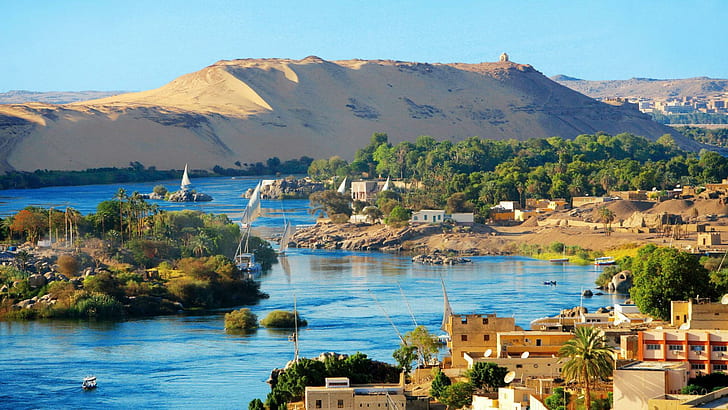FAQs
What is the best time in the year to visit Egypt ?
If weather is your primary concern, the best time to visit Egypt is during the northern hemisphere fall, winter or early spring (October to April), when temperatures are lower. To avoid the crowds at ancient sites like the Pyramids of Giza, Luxor, and Abu Simbel, try to avoid peak season (December and January).
What to wear, and what to bring with you ?
When visiting Egypt, it is important to dress conservatively and comfortably, especially in larger cities such as Cairo, Luxor, and Aswan. Tourist sites may have a more relaxed dress code, but it is recommended for women to avoid revealing clothing to prevent unwanted attention or offending locals. Opt for clothing made of cotton, such as short-sleeved t-shirts, capri pants, or knee-length skirts. Bring along a wide-brimmed hat, sunglasses, and a light shawl or scarf to protect yourself from the sun. For footwear, bring two pairs of comfortable walking shoes and a pair of swim shoes. Bring a swimsuit, cover-up, and at least one smart casual outfit for dinners and evening outings. Dressing in layers is also recommended to prepare for varying weather conditions. Be sure to bring travel-sized personal toiletries, insect repellent, high-SPF sunscreen, after sun lotion, and any medications or vitamins you regularly take. Extra batteries and chargers for electronic devices may not be readily available in the places visited on the tour. Close-toed shoes are recommended as the streets can be dusty, and they will also protect your toes from the hot sand at sites along the Nile. Pack tissues or wipes as toilet paper may not always be available, and remember to bring any important medications in your carry-on bag Egypt is generally a conservative country and has a very warm climate. Dressing for modesty and comfort is encouraged, especially in big cities like Cairo and the city centers in Luxor and Aswan. Although the dress code at tourist sites tends to be relaxed, we recommend that women avoid revealing clothes such as short shorts and short skirts to avoid attracting unwanted attention or offending the locals. It is best to wear short sleeved t-shirts, capri pants or skirts that cover the knee. We suggest bringing clothes made of cotton, a wide brimmed hat to cover your face and back of your neck. Sunglasses and a light shawl or scarf are also valuable accessories for your trip. If you have two pairs of comfortable (broken in, not brand new) walking shoes, take both pairs. We also suggest bringing a pair of swim shoes, a swimsuit, cover-up, and at least one smart casual outfit for dinners and evening outings. Packing to dress in layers is another way to prepare for a variety of weather conditions. Finally, remember that the countries visited on this tour are casual, and comfort should dictate your wardrobe for the tour. We highly suggest that you bring travel-sized personal toiletries as those available locally may not be the brands you prefer. Be sure to bring insect repellant, high SPF sunscreen, after sun lotion, common drugs and vitamins you normally take as well as extra batteries and chargers for your electronic devices as these may not be readily available in the places visited on this tour. We also suggest bringing close-toed shoes as the streets are dusty and to protect your toes from the hot sand on the sites along the Nile. Small packs of tissues or wipes will also come in handy at rest stops, as toilet paper is not always available. Remember to pack medications in your carry-on bag.
Is Egypt considered a safe destination in comparison to other countries in the world ?
Egypt generally has a very low crime rate. Travelers will be safe in Egypt if they take sensible precautions that would apply to any tourist destination around the world.
Is it allowed for non-Muslims to enter mosques in Egypt ?
Non-Muslims are generally welcome to visit mosques in Egypt; however, it is always advisable to seek permission before entering mosques outside Cairo and Alexandria where people are less accustomed to tourists. Tourists and foreigners are welcome in almost all mosques in Egypt Tourists are more than welcome to visit most mosques at any time expect when they are being used for prayer, on Friday during the prayer so your visit will be adjusted by your guide.
Is there any dress code to be followed during visiting a mosque in Egypt ?
There aren’t really special clothes to be put on while visiting a mosque in Egypt; however, modest dress would be highly recommended and in some mosques, women will be asked to cover their hair and perhaps their arms and legs. Both women and men will be asked to remove their shoes before entering a mosque.
Are tourists allowed to enter the Christian monuments in Egypt ?
In Egypt, churches are treated the same as mosques. Most churches and monasteries welcome tourists and foreigners, except during the Lent. Modest dress is also advisable while visiting Christian monuments in Egypt.

